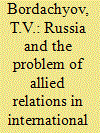| Srl | Item |
| 1 |
ID:
175702


|
|
|
|
|
| Summary/Abstract |
This article uses thought-experiments grounded on Clausewitz’s theory of war to (1) explain the limitations and dispel the confusion that stems from transposing “victory" from the outcome of battle (which admits zero-sum results) to the outcomes of war (which largely do not), and (2) to propose criteria for the substantive assessment of the outcomes of the political use of war, gauging the extent, cost, and implications of political goals gained, approximated or leveraged, and the result and effects of the use and expenditure of force to the resulting balance of forces among belligerents and in the broader political environment.
|
|
|
|
|
|
|
|
|
|
|
|
|
|
|
|
| 2 |
ID:
190536


|
|
|
|
|
| Summary/Abstract |
This paper examines the nature and key features of allied relations between the great nuclear powers and other members of the international community. The author analyzes the specifics and problems of Russia's interaction with its allies in the post-Soviet space and justifies the importance and urgency of promoting the consolidation of their sovereignty and foreign policy independence.
|
|
|
|
|
|
|
|
|
|
|
|
|
|
|
|
| 3 |
ID:
165147


|
|
|
|
|
| Summary/Abstract |
Military obsolescence affects the capability of all militaries as it relates to serviceability and performance when countering potential opponents, and more specifically in the case of developing countries lacking strong indigenous defence industries. The gradual nature of this military concern has not been studied systematically, in contrast to military modernisation. This paper presents a synthetic framework composed of several indicators to examine military obsolescence. Vietnam has been selected for the application of the framework for its large number of Cold War legacies and the strategic pressure from China. Hanoi's ageing assets would undermine its position vis-à-vis Beijing, and its defence investment policies face the dilemma of choosing to spend more on naval and aerial power, or ameliorating its army which is technologically lacking compared to its Chinese counterpart.
|
|
|
|
|
|
|
|
|
|
|
|
|
|
|
|